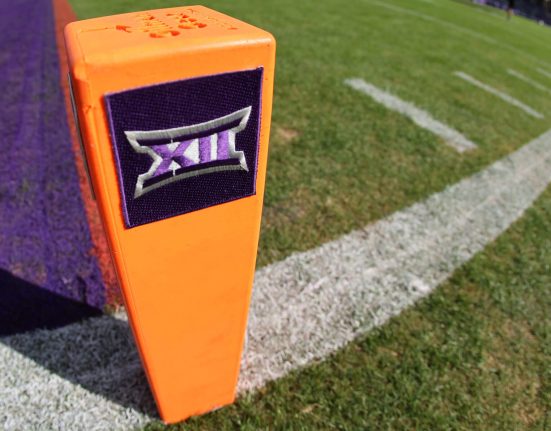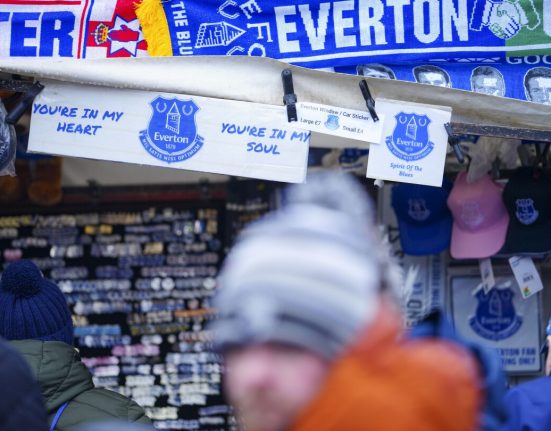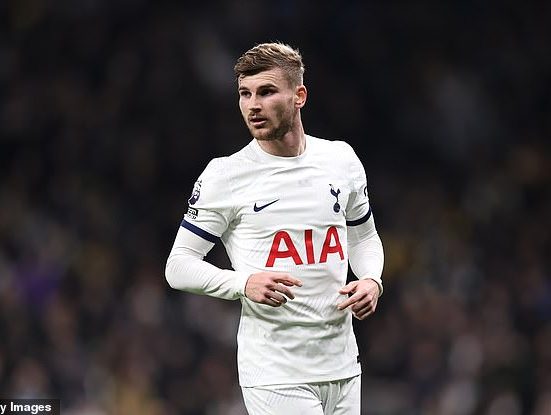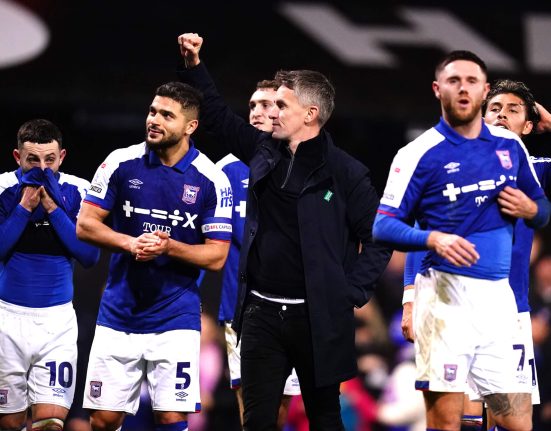When Farhad Moshiri announced he had agreed to sell his 94.1 per cent stake in Everton to 777 Partners on September 15, it was hoped the deal would be wrapped up by Christmas, with the Florida-based investment firm properly in charge in time for the winter transfer window.
The club’s official statement said the “closing of the transaction is expected in the fourth quarter of 2023” and the briefing was that regulatory approval from the Financial Conduct Authority, English Football Association (FA) and Premier League would take “10 to 12 weeks”.
So, what are we to make of the news that kicked off week 17 of this process when it was revealed on Monday that 777 has loaned the club another £40million ($51m), taking Everton’s total IOU to its prospective new custodians to £142m?
The unofficial statement, issued through the usual “sources close to the deal” channels, was that this represented further proof of 777’s commitment and evidence that Premier League approval — the last and by far the largest regulatory hurdle to clear — was imminent. That, however, is not the consensus, with many of those close to the club, and dotted throughout the football industry, seeing it differently.
For them, the leap in 777’s loan to Everton from £100million to £142m — a month after it had been briefed that £100m was 777’s limit and that sum should be enough to see the club through January — suggests 777 knows Premier League approval is not imminent. The opposite, in fact.
Some have suggested Everton’s hard-working auditors may have asked to see more working capital go into the business before signing off the annual accounts all clubs had to file with the league before the end of December. Some wonder if Laing O’Rourke, the contractor building Everton’s new stadium, has demanded advance payment for a few more months’ work at the Bramley-Moore Dock site.
Others believe this is 777’s attempt to make any possible rival bid for Everton even more unattractive by piling more debt onto the club.
Of course, some of you will point out that this all sounds like guesswork and gossip and what we really have here is the only bit of physics most of us remember: nature abhors a (news) vacuum.
But while there have been no major developments on the main takeover story, there have been plenty from 777’s existing planes-to-players portfolio of investments.
In recent weeks, the Italian tax authorities opened another investigation into Genoa, the Serie A club owned by 777. It seems they were late filing some paperwork in November.
No biggie, right? Well, it could have been, as Genoa were docked a point in 2022 for late tax payments, so they have been warned. Fortunately, it seems a further deduction is unlikely as the mistake — one unticked box — has been rectified.
This story would have barely registered for most clubs, but 777, for reasons that have been widely reported, is held to a different standard, which leads us to its Belgian club, Standard Liege.
In mid-December, around the time 777 should have been getting the keys to Everton, Belgian football’s club licensing committee handed Standard a transfer ban for missing wage payments and unpaid taxes.
Again, the misunderstanding was fixed within a week and the ban was lifted, but the episode set tongues wagging once more about 777’s ability to finance the seven-club empire it already has, let alone the Herculean task it will be taking on if it adds loss-making, heavily-indebted and relegation-threatened Everton to the mix.
And last week, Standard filed another large annual loss, which slightly punctured 777’s claims to be turnaround specialists.
But there are fresh questions about 777’s business acumen popping up wherever you look in their sprawling network of subsidiaries.
On December 11, three Irish aircraft leasing companies filed a case at London’s High Court that claims 777 owes them $28.5million (£22.4m) in fees and costs associated with four Boeings they leased to the firm’s Canadian budget airline Flair between 2019 and 2022.
In a statement, the three Irish firms said: “Despite being repeatedly notified of their financial obligations, 777 Partners have continued to ignore calls to settle outstanding payments of almost $30 million. 777 Partners cannot just ignore its financial and contractual obligations. This legal action is a last resort.”
In regards to the Irish companies’ case, a 777 spokesperson said: “The English proceedings are likely to be the subject of a stay application (halting whole or part of the proceedings) given that the position of 777 Partners remains that (they are), at best, premature and, at worst, possibly abusing the English court system.
“777 Partners remains supportive of Flair, the lessee, in its ongoing litigation against the egregious behaviour by Airborne, the lessor, and continue to support the just conclusion of the case in the Ontario courts where it is currently being handled.”
Eleven days after the aircraft companies’ claim, a Danish businessman named Lasse Meilsoe filed a case in Miami, Florida seeking repayment of two loans he made to Adlon, a subsidiary of 777, in 2021. His claim is for $1.8million.
When asked for comment on these two most recent cases, 777 said it does not usually discuss active legal proceedings and had nothing to add in regards to Meilsoe’s claim beyond that it has lots of subsidiaries, so it often gets dragged into disagreements that are not of its making.
In Genoa, Liege, Liverpool, London, Miami, Ontario and several other jurisdictions, 777 is looking for just conclusions to its disputes wherever they arise.
It certainly keeps the partners busy.
Three bids for West Bromwich Albion
Everton are by no means the only famous English club waiting for Mr (or Mrs) Right to make all their troubles disappear as we start a new year — West Bromwich Albion fans could tell Evertonians a thing or two about debts, temporarily embarrassed millionaires and takeover sagas.
For those of you new to this tale, a Chinese consortium led by businessman Guochuan Lai bought a majority stake in Albion, then a Premier League side, for £175million in 2016. It was a price tag that seemed steep at the time but now looks like the high-water mark of English football’s Chinese investment boom, a period of irrational exuberance only marginally less ridiculous than the Bored Ape non-fungible token craze.
Under his ownership, Lai’s lads have been relegated to the Championship, promoted out of it and then relegated to it again. They have also consistently lost money, a situation not helped by his unfortunate habit of borrowing money from the club on terms that are very friendly to him but not so sensible for West Brom.
Anyway, with Albion no longer in receipt of parachute payments (the money clubs receive for three years following relegation from the Premier League), strict controls on the flow of money in and out of China, and loans to settle, Lai has been trying to sell the club for two years.
The story of that process, if that is the right word, is similar to the processes that have taken place at other Chinese-owned sides across European football: unreasonable expectations, too many cooks, lots of time-wasters (see also Birmingham City, Reading, Southampton and Wigan Athletic).
However, it seems matters are finally coming to a head, with three credible bids in the mix and Lai now entertaining more realistic prices for his shares.
The frontrunner remains the group put together by Manchester-based lawyer Chris Farnell and Egyptian investor Mohamed Elkashashy, who have teamed up with local businessman Alex Hearn, owner of domestic heating firm Warmfront. Other investors are involved, too, but their names remain under wraps for now.
Hearn has become involved in the project because in 2021 he lent Lai £2million, which was secured against 2.35 per cent of West Brom’s shares. That loan is due for repayment next month and is now worth considerably more than £2m. In the event of a takeover, Hearn is happy to convert that debt into equity.
The second suitor is Armenian entrepreneur Roman Gevorkyan, the owner of the Noah Football Group, a multi-club venture that includes a stake in Paris FC of the French second division. Gevorkyan has been looking for an English team for some time and has previously made bids for Charlton Athletic and Reading.
The final bid is the most unusual in that the family who would provide the cash have never been linked with a big investment in sport before, but they certainly have the money and seem to be the horse backed by MSD Partners, the investment firm linked to American IT billionaire Michael Dell that happens to be West Brom’s biggest creditor. Having loaned the club £20million in December 2022, MSD gave them an additional £7m in November.
The fact MSD likes Shilen Patel, the Florida-born son of Indian-American cardiologist-turned-entrepreneur Dr Kiran Patel, gives his bid a reasonable shot of success should the Farnell-Elkashashy-Hearn group falter. Having owned several businesses of his own, Shilen now runs the Patel family office, which claims to have over $2billion in assets under management.
Lai has options, then.
West Brom fans will no doubt want to wish him all the best while he makes a speedy decision on the matter.
Premier League vs EFL for the future of English football
Speaking of issues that need resolving, there is a tasty clash on the fixture list next week that may have escaped your attention: the English Football League vs the Premier League.
It is in the Culture, Media and Sport Select Committee Cup and kicks off at Portcullis House in Westminster, central London, at 10am UK time on Tuesday. And, just like the new and improved European Super League, you can watch it for free — at parliamentlive.tv.
At stake is maintaining the moral high ground in the long-running dispute over how much responsibility the 20 clubs who happen to be in the Premier League in any particular season should take for the financial sustainability of the 72 sides in the EFL’s three divisions.
The short version of this debate is that almost everyone agrees the Premier League should take some of the strain — those with the broadest shoulders and all that — but nobody agrees on how much or how that strain should be shared out within the Premier League’s 20 members.
This is why the English football’s top flight has still not been able to put its so-called “new deal for football” up for a vote at one of its regular shareholder meetings, despite having promised the UK government it would do so more than a year ago.
The EFL, for its part, does not have a huge amount of say in the matter, as it is the party in these negotiations asking for more money, although its 72 clubs are nicely spread throughout the country and we’re now into a general election year in Britain.
That partly explains why the 11 members of parliament on the CMS select committee — six from the ruling Conservative Party, four from Labour, the official opposition party, and one Scottish Nationalist — are interested in the topic.
OK, that is unfair, as this select committee’s job is to hold the government to account for its culture, media and sport policies, so it has always taken an interest in how the country’s biggest sport has been governed and financed. But that interest has ratcheted up following several high-profile bankruptcies at EFL clubs and the widespread anger caused by the Premier League’s six biggest teams’ attempt almost three years ago to join a breakaway European Super League.
Those shocks persuaded the government to commission a fan-led review into the game’s governance in 2021. That resulted in a recommendation for the creation of an independent regulator for football, which the government accepted and is about to deliver via new legislation.
The idea of independent regulation has cross-party support and, as we reported earlier this week, Prime Minister Rishi Sunak remains committed to giving the new watchdog the power to enforce a new financial distribution formula if football cannot decide one itself.
That brings us back to Tuesday’s fixture, which will probably see EFL chair Rick Parry try to explain once more why his clubs need more money to come down the pipe and will accept stricter spending limits, the loss of revenue-raising cup-competition replays and several other strings the Premier League wants to attach to the deal, because EFL clubs do not have much choice.
And once he has finished, Premier League chief executive Richard Masters will try to explain why his clubs have been unable to deliver that deal as there are all manner of terribly complicated issues to consider and unintended consequences to guard against.
Neither will be looking forward to the grilling they will get — and there is always a bit of grandstanding from the panellists — but Masters will get a tougher time of it than Parry, partly because some of the panel were hoping they might get the chance to quiz the league’s lesser-spotted chair Alison Brittain, but she has decided against it, forcing Masters to don his armour once more.
(Top photo: 777 Partners co-founder Josh Wander shakes hands with Everton owner Farhad Moshiri in November. Peter Byrne/PA Images via Getty Images)







